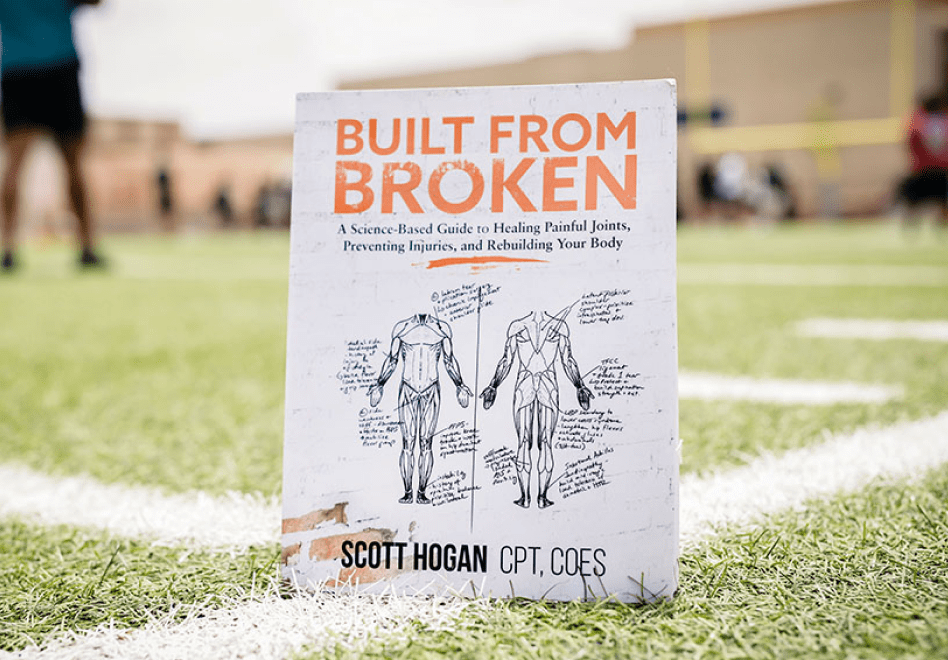
Be built (to last).
The right supplements can help you recover naturally and build a resilient body.

Supplement Quiz
Take this short quiz to discover the perfect supplements for your needs and goals.
About SaltWrap

Built from Broken
Get the best-selling book from SaltWrap founder, Scott Hogan, and start rebuilding today.
Does Caloric Restriction Improve Cognitive Performance?
By Joe Zagami
Let’s just say it: nobody likes dieting.
We enjoy the results, like improving overall health – and looking better naked. But the process isn’t exactly fun.
Perhaps that’s why many people will go to great lengths to work around the golden rule of dieting: caloric restriction is king.
For instance, you likely know someone who chases any and every fad diet they see online in hopes of getting quick and easy results. Or maybe you know someone who could medal in mental gymnastics with how they schedule their meals – especially cheat meals – in hopes of “beating the system.”
Well, a recent study shows that not only is caloric restriction still the bottom line for weight loss, but it may also come with another nice benefit: better cognitive performance.
Even better? It may not take as much restriction as you think.

Study: Caloric Restriction Improves Cognitive Performance
A study published in the New England Journal of Medicine followed 604 people for three years. None had any signs of cognitive issues. But they all had suboptimal diets (as determined by a 14-question survey) and a body-mass index (BMI) of 25 or higher.
(If you were wondering, yes, we do have issues with the study already. More on those in a moment.)
Researchers randomly placed subjects into two groups.
The first group followed the MIND diet, a combination of the Mediterranean and DASH diets purported to help prevent or delay cognitive decline. The second group stayed on their self-reported, suboptimal diets.
Researchers also told both groups to reduce their daily caloric intake by 250 calories.
Over the next three years, subjects had regular phone and in-person dietary consultations. They were also advised about things like portion size to help keep calorie counts correct. People on the MIND diet were also advised about specific foods to avoid.
Subjects also took cognition tests at six, 12, 24, and 36 months. Some were also given MRI scans to observe any physical changes in their brains.
Lots of details to keep track of. But here’s what it boiled down to…
After three years, both groups showed modest boosts in cognitive scores. Yet there was no significant difference in improvement between groups.
In fact, since subjects in both groups lost about 11 lbs. on average, researchers suggest that the weight loss alone likely was responsible for increases in cognitive performance.1
It all sounds very encouraging. But there are some important things that need to be addressed.
What Could Have Been Done Better?
As we said, there are a lot of details to keep track of with this study. And there’s a lot about this study that we didn’t like.
For starters, any time that a study relies on questionnaires – even in part – to get information about subjects, you’re asking for trouble.
It’s not just about honesty.
We’re all human. We all forget things. We’re sure someone in one of the groups accidentally omitted at least one cheeseburger.
So, there’s that.
There’s also the BMI factor. Many experts view BMI as a sort of shorthand – at best. Others view it as, well, kind of a joke.
After all, consider that at the height of his Mr. Olympia title reign, Arnold Schwarzenegger would’ve been considered obese according to his BMI.

Arnold Schwarzenegger is filmed for the legendary Pumping Iron documentary, 1975. (Source: Wikimedia)
We’re not mathematicians, but something there doesn’t add up.
And while we’re on our soapbox here, we’re not exactly thrilled with the consultation arrangement. Much like the questionnaires, it’s easy to mess up. Who wouldn’t “accidentally omit” things? (See the cheeseburger example above.)
Unless you’re in a controlled setting, there’s wiggle room. Perhaps a lot of it. And that’s not good for rock-solid results.
Despite any potential flaws in the study’s design, the results are encouraging. But not entirely surprising.
Caloric Restriction (Still) Rules
Recall that when it comes to diet, caloric restriction is king.
Heck, back in 2010, a nutrition professor at Kansas State University reportedly lost 27 lbs. and significantly improved his cholesterol by eating mostly junk food. The key here is that he stayed in a significant caloric deficit.2
To be clear, we’re not recommending you eat only Twinkies to lose weight.
We believe food choice matters a lot in terms of optimizing performance and long-term health. (If you haven’t seen it, check out Scott’s in-depth guide to the anti-inflammatory diet here.) So, why bring that up?
While extreme (and with questionable long-term health implications), it supports the underlying result of this new study: when it comes to weight loss, what you eat may not be as important as how much you eat.
And in terms of benefits, this idea seems to apply to more than just weight loss. In the case of the new study, we’re talking about improved cognitive function across the board.
That brings up another point worth making: the caloric restriction in this study – just 250 calories per day – was very mild.
Consider that there are about 3,500 calories of energy in a pound of fat.3
Had these subjects reduced their caloric intake by 250 calories, and burned 250 calories with exercise (just 45 total minutes of walking on a treadmill), they likely could’ve lost about a pound per week.
Over the course of three years – and with plenty of room for slip-ups and setbacks built in – that could amount to not only life-changing weight loss, but perhaps even more significant cognitive performance benefits.
So, what does all of this mean?
Putting It All Together
Caloric restriction seems to have health benefits that go beyond carring around less body fat.
That said, there’s one more important thing worth mentioning: the exact mechanisms behind improved cognitive function in this study aren’t fully understood.
For instance, was better cognitive function an outcome of restricting calories? Or burning stored fat for energy? Or simply having less body fat?
Multiple studies have observed similar brain benefits, but the “why” is still unclear.4
(Yes, we’ve written before about the link between exercise and better cognitive function. But this latest study didn’t even take exercise into consideration.)
That’s the bad news.
The good news is that we know making your body work hard benefits your brain.
Whether by having less energy at its disposal (caloric restriction) or doing challenging physical activity (exercise), you can see benefits in cognitive function.
But these aren’t the only ways to have a brain that feels sharper, faster, and more “dialed in.”
For instance, Bacognize®, a patented form of the natural adaptogen Bacopa, is clinically shown to improve working memory. This includes things like information processing, focus, attention, learning, and problem-solving abilities.
That’s why we made it one of the star ingredients in Adaptogen Greens™.
This mind-body resilience formula delivers science-backed results that you can feel – so that you can conquer stress, improve mental performance, and bounce back faster.
And without counting any calories.
Click the button below to see why Adaptogen Greens™ is the perfect choice for anyone who wants to become more mentally – and physically – resilient.
Founder: Scott Hogan

I created SaltWrap to bring together the most practical ideas in therapeutic sports nutrition, corrective exercise, and functional fitness — with the goal of keeping you (and myself) strong, mobile, and built to last.
I've worked as an A.C.E. Certified Personal Trainer, Orthopedic Exercise Specialist, and nutritional supplement formulator.
But more importantly — I've spent most of my life battling injuries, joint pain, and just being plain beat up. So I know what it's like to struggle toward fitness goals.
SaltWrap is here to push you through injuries, setbacks and perceived physical limitations. To a place beyond what you think you're capable of. Sign up here to stay in the loop.
Learn more about my best-selling injury prevention and recovery book, Built from Broken.







